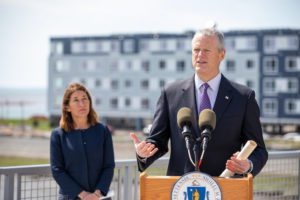Who is a member?
Our members are the local governments of Massachusetts and their elected and appointed leadership.

Gov. Charlie Baker and Lt. Gov. Karyn Polito announce the filing of a $3.5 billion economic development bill in Lynn on April 21. (Photo courtesy Joshua Qualls/Governor’s Press Office)
Gov. Charlie Baker filed a $3.5 billion economic development bill today that would fund projects to strengthen state infrastructure, create jobs and invest in cities and towns.
The legislation includes $2.3 billion in funding from the federal American Rescue Plan Act and $1.26 billion in capital bond authorizations.
“The Commonwealth has an opportunity to make significant investments now to help our communities and local economies emerge stronger in a post-pandemic world,” Baker said at a press event in Lynn. “The FORWARD legislation [An Act Investing in Future Opportunities for Resiliency, Workforce, and Revitalized Downtowns] will make investments in every municipality in Massachusetts, strengthening downtowns, improving the resiliency of infrastructure and giving workers the tools they need to succeed in today’s economy.”
Lt. Gov. Karyn Polito said the bill will support hundreds of local projects, including funding to improve green spaces and grants to support economic development.
The bill would provide nearly $970 million to support revitalizing local downtowns and communities, including $318 million in ARPA funding and $650 million in a bond authorization. This includes $550 million for the MassWorks program, including $400 million in reauthorization and $147 million in ARPA funds to support 94 local projects. Nearly 250 municipalities would receive downtown recovery grants totaling $108 million.
The administration said the bill, in part, is responding to last year’s “Future of Work” report, which found that downtowns will look fundamentally different coming out of the COVID-19 pandemic, as many people have changed how and where they work.
The bill would authorize $270 million to support housing production across the Commonwealth, including affordable rental housing production and rehabilitation, public housing, climate resilient housing, and transit-oriented development. The bill includes policy proposals to increase housing production, including an increase of the cap on the Housing Development Incentive Program from $10 million to $30 million.
The bill would use $1.2 billion of the state’s ARPA funds for climate resiliency and preservation efforts. This includes $750 million for the Commonwealth’s clean energy industry, for projects such as electric vehicle rapid charging stations at Logan International Airport, the expansion of the MassCEC Wind Technology Training Center in Charlestown, more than $70 million in investments related to the New Bedford Marine Terminal, and a greater focus on higher education and workforce training in an effort to support the growing clean energy industry.
The bill also proposes $413 million to support more than 100 projects across state parks and trails, water and sewer, and environmental infrastructure grant programs.
The bill includes $325 million in ARPA funding for workforce efforts, including $300 million for the Unemployment Trust Fund to address unemployment overpayments. The HireNow program, which provides grants to employers to train and hire new workers, would receive $25 million.
To support the innovation economy, the bill includes $50 million for a new competitive and secure future innovation program to make strategic investments in purpose-driven research, technology development, and innovation, and in emerging technologies such as artificial intelligence and machine learning (AI/ML), robotics, quantum information science, cybersecurity, communications, and digital health.
ARPA funds to be used for COVID response include $20 million for local workforce training grants to recruit and train municipal employees that deliver important public services across Massachusetts.
The legislation would allow the Massachusetts Convention Center Authority to sell the Hynes Convention Center, with proceeds from the sale going to affordable housing development and the Back Bay area. Occupancy levels at the Hynes have been around 60% in recent years, according to the administration.
Housing and Economic Development Secretary Mike Kennealy said the package reflects a “spirit of collaboration by targeting funding toward key priorities in all cities and towns across the Commonwealth.”
Energy and Environmental Affairs Secretary Kathleen Theoharides said the bill would make climate resiliency investments at the state and local level and promote clean energy solutions, “fostering innovation and technology advancements, continuing the growth of a homegrown clean energy and climate workforce, and beginning construction of important resilient infrastructure improvements.”
Federal ARPA funds must be committed by states by the end of 2024 and spent by the end of 2026. The governor said his bill prioritizes investing ARPA funding into projects that are already sufficiently defined and narrow in scope so they can be completed by 2026.
See the administration’s press release for a more complete list of items in the FORWARD package.
• Text of An Act Investing in Future Opportunities for Resiliency, Workforce, and Revitalized Downtowns (405K PDF)
• View list of proposed “APRA 2.0” spending by community